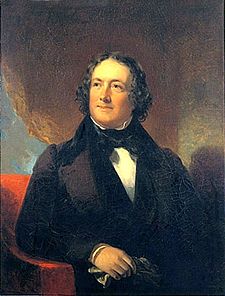Nicholas Biddle (banker)
| Nicholas Biddle | |
|---|---|

Portrait by William Inman, c.1830s
|
|
| President of the U.S. Second Bank | |
|
In office 1822–1836 |
|
| President |
James Monroe John Quincy Adams Andrew Jackson |
| Preceded by | Langdon Cheves |
| Succeeded by | Bank abolished |
|
Member of the Pennsylvania Senate for Philadelphia |
|
|
In office 1814–1816 |
|
|
Member of the Pennsylvania House of Representatives for Philadelphia |
|
|
In office 1810–1814 |
|
| Personal details | |
| Born |
January 8, 1786 Philadelphia, Pennsylvania, U.S. |
| Died | February 27, 1844 (aged 58) Philadelphia, Pennsylvania, U.S. |
| Political party | Whig |
| Spouse(s) | Jane Margaret Craig (m. 1811; his death 1844) |
| Children | Edward Charles John Craig Meta Adele Jane |
| Parents | Charles and Hannah (née Shepard) Biddle |
| Alma mater |
University of Pennsylvania Princeton University |
| Profession | Lawyer, banker, financier |
| Religion | Quaker |
| Signature |  |
Nicholas Biddle (January 8, 1786 – February 27, 1844) was an American financier who served as the third and last president of the Second Bank of the United States (chartered 1816–1836).
Nicholas Biddle was born in the City of Philadelphia, in the Commonwealth of Pennsylvania. Ancestors of the Biddle family immigrated to Pennsylvania when the proprietor, William Penn (of the Religious Society of Friends, or "Quakers") visited, and fought in the pre-Revolutionary colonial struggles. His father, Charles, was prominent in his devotion to the cause of American independence and served as Vice-President of the Supreme Executive Council of Pennsylvania, alongside Council President, the famous Benjamin Franklin (1705/06–1790).
An uncle with the same name, Nicholas Biddle (1750–1778), whose residence was also in Philadelphia, was an early colonial and American Revolutionary War naval hero, who died during the rebellion. Another uncle, Edward Biddle, was also a member of the First Continental Congress of 1774. Young Nicholas's preparatory education was received at an academy in Philadelphia, where his progress was so rapid that he entered the class of 1799 in the University of Pennsylvania (formerly the "Academy", then the "College of Philadelphia" until 1791), and would have taken his degree at the age of thirteen had it not been deemed wise to keep him longer at his books. He was accordingly sent to Princeton (formerly the College of New Jersey), entered the sophomore class, and was graduated in 1801 as valedictorian, dividing the first honor of the class with his only rival. His younger brother Thomas Biddle, a War of 1812 hero who died in a duel, should not be confused with his cousin by the same name, who became a leading exchange broker in Philadelphia.
...
Wikipedia
